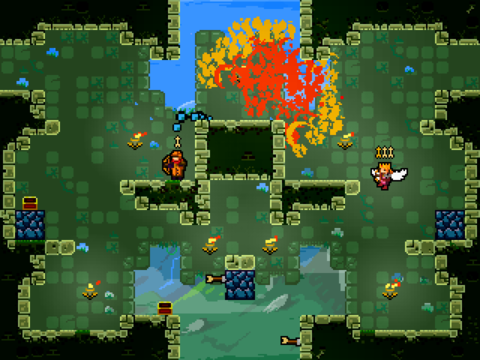I'm currently on a flight to San Francisco for this year's Game Developers Conference, and it's the first time I'm attending without living in the city it's hosted in. It certainly weirds me out to type those words, and reminds me that I've actually been gone since last June. Damn.

The reason I'm heading to the Bay Area a day earlier is to give a talk at the Critical Proximity conference, a one-day event focused on discussions surrounding games criticism. My talk is titled "Bridging the Critical Gap," and tries to illuminate the vast difference in approaches to games writing in the biggest games publications against the many smaller blogging communities.
When BioShock Infinite was released, it was more or less universally lauded. That wasn't so in the critical circles I follow. The exact opposite reaction was playing out. Put aside whether you fall into one camp or the other: how come there's such uniformity on one side? I've said this before and I'll say it again, but when a new game comes out, I'm always interested in hearing what the person who hated it has to say about it. It's why I appreciate Tom Chick's work, even if we rarely agree.
My talk is only 10 minutes long and I already hate most of it, but like anything else, eventually you have to stop, draw a line, and move on. That happens when a game has to ship, and it happens when a talk has to be given. The presentations are supposed to be recorded, and I'll make sure to pass on a link when it's available. I gave another talk to a group of college journalists recently, too, and I've been meaning to publish it online. Maybe that'll happen after I can give some more time to making my website not terrible.
Oh, right! This is being published on a Saturday because I ran out of time this week. There will be no Worth Playing this week or next week, and it's unlikely Worth Reading will happen next week, either. Look for a jumbo-sized version of both the week after. Other programming notes: I'll be on the podcast next week, as well! If we're doing an Unprofessional Friday, I should be around for that, too.
You Should Read These
The story of Flappy Bird still remains somewhat mysterious, and it will probably always be that way. But David Kushner's article, taken at face value, is the one I want to believe. Kushner managed to do what many other journalists have been foaming at the mouth for: talking to designer Dong Nguyen. The developer comes across as earnest as his now-defunct Twitter account, and he continues to state the reason for removing Flappy Bird had to do with being distressed over how addictive people had become. I wonder if his next game will have "from the developer of Flappy Bird" on the splash screen? He strikes me as the kind of guy who is willing to roll the dice and release his game into the wild, though.
"But the hardest thing of all, he says, was something else entirely. He hands me his iPhone so that I can scroll through some messages he's saved. One is from a woman chastising him for "distracting the children of the world." Another laments that "13 kids at my school broke their phones because of your game, and they still play it cause it's addicting like crack." Nguyen tells me of e-mails from workers who had lost their jobs, a mother who had stopped talking to her kids. "At first I thought they were just joking," he says, "but I realize they really hurt themselves." Nguyen – who says he botched tests in high school because he was playing too much Counter-Strike – genuinely took them to heart."

You have every right to be upset when an excellent new local multiplayer game comes out, and you can't play it because your gaming friends don't live near you. Local multiplayer is having a bit of a renaissance right now, and it means some people are excluded from participating. Rather than chalking it all up to a "design decision," Super Pole Riders (part of the Sportsfriends package) designer Bennet Foddy has written a terrific feature explaining why online modes are so notoriously difficult to implement.
"Lag compensation is how the server tries to guess what you were seeing on your computer when you pressed a button on your controller. When your computer tells the server you fired your gun in Battlefield 4, the server rewinds time a little bit so it can guess what you were looking at when you clicked your mouse. If you were aiming at an enemy on your screen, it awards you a hit, even if you were aiming at the wrong place according to the server or your opponent's computer.
Of course, nobody notices these discrepancies, because it's really hard to see whether or not your enemy's gun barrel is pointed at you or slightly to one side of you, especially when there's simulated blood and screen shake and blurring all over the place. We just accept that we got shot, cry a little bit and move on. Lag compensation works really well in first-person shooters for this reason.
In a game like TowerFall, though, you have a pretty good idea of whether an arrow should hit you, or whether a stomp should connect. If it looks like it's going to miss on your computer, and then you die because of something that only happened on your opponent's computer, that's going to feel broken and unfair."
If You Click It, It Will Play
Like it or Not, Crowdfunding Isn't Going Away
- Frog Fractions 2 is coming, though we won't actually know when it's coming.
- Dysfunctional Systems is a series of visual novels that sounds pretty interesting.
Tweets That Make You Go "Hmmmmmm"
Last gen consoles hanging on make me feel like I'm trying to run while having a pair of four year olds hanging onto my ankles.
— Cliff Bleszinski (@therealcliffyb) March 12, 2014
I KNEW EVERYTHING ON YOUR LIST OF 14 THINGS I WASNT SUPPOSED TO KNOW ABOUT SONIC YOU FUCKING PIECE OF SHIT
— MURDERLEINE (@DVDBoxSet) March 12, 2014
Candy Crush maker decides it will be worth about $7.6 billion before its collapse http://t.co/RAlDRFAb4y
— John Teti (@johnteti) March 12, 2014
Great design is apparent when you appreciate a game you already loved even more on subsequent playthroughs.
— ShawnElliott (@ShawnElliott) March 8, 2014
it’s weird how puns are the lowest form of humor but the highest form of game title
— Zach Gage (@helvetica) March 14, 2014
At 44%, Final Fantasy: The Spirits Within has the highest Rotten Tomatoes score of any video game film adaptation.
— superannuation (@supererogatory) March 13, 2014
Oh, And This Other Stuff
- Patricia Hernandez writes about how we don't actually want smart A.I. in games.
- James Surowiecki examines the idea of a one-hit wonder through the eyes of Candy Crush Saga.
- Chris Plante tracked down the people involved in that disastrous Street Fighter movie.
- Digital Foundry releases its analysis of the console versions of Dark Souls II.
- Jenn Sandercock reflects on making games about love and acceptance.
- Simon Parkin, one of the biggest Souls fans I know, weighs in on the sequel.
- Kim Correa recounts her time as a women playing DayZ.
- Jon Robinson interviews Madden producers about features the NFL asked them to remove.
- Dave Lee speaks with Papers, Please designer Lucas Pope about the game's success.
- Nick Clark discusses how corners were cut to pull off Journey's multiplayer.
- Jeffrey Matulef profiles Hideo Kojima, a man who cannot escape his past.
- Jason Schreier has a lengthy feature on Peter Molyneux, and it's not entirely flattering.